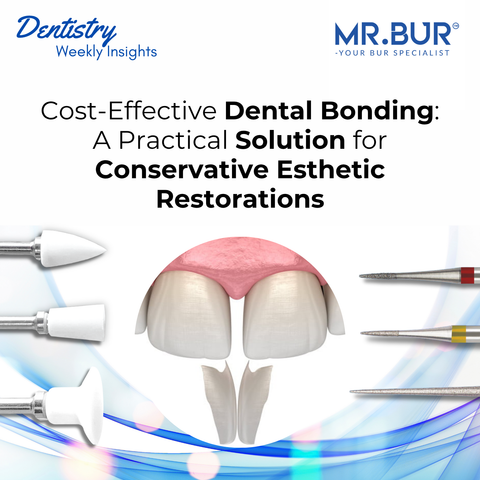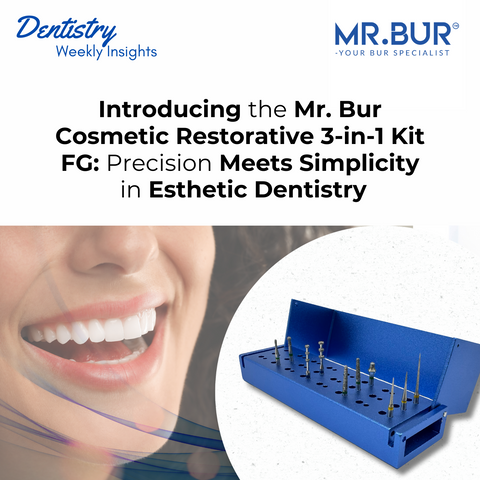In fixed prosthodontics, the long-term success of crowns and veneers starts at the finish line. The type of marginal designchosen during tooth preparation affects everything from restoration fit and fracture resistance to gingival health and esthetic integration. Among the most frequently used designs are the chamfer and the shoulder margin, each suited to different materials and clinical scenarios.
This article explores when and why to choose each margin design, offering procedural insight and practical recommendations, including bur selection from the Mr. Bur preparation series.
Understanding Finish Line Geometry
The finish line serves as the junction between prepared tooth structure and the future restoration. The geometry of this line plays a pivotal role in:
-
Ensuring marginal seal and adaptation
-
Influencing esthetic outcomes
-
Maintaining soft tissue health
-
Conserving tooth structure
Selecting the appropriate finish line depends not only on the chosen restorative material but also on clinical goals such as conservation, esthetics, and margin placement.
1. Chamfer Margin
Design Characteristics:
-
Smooth sloping edge
-
Rounded internal angle
-
Width typically ranges from 0.3–0.5 mm
Best Indicated For:
-
Full metal crowns
-
Monolithic zirconia restorations
-
Lingual aspects of PFM crowns
-
Situations requiring tooth conservation
Clinical Advantages:
Chamfer margins are known for being minimally invasive while offering clean, distinct boundaries for the lab. The rounded internal angle minimizes stress concentrations and allows easier preparation in deeper areas, such as posterior teeth or near pulp chambers.
To create an ideal chamfer margin, we recommend using the Mr. Bur Taper Round End Coarse Chamfer Diamond Bur FG series. Its design supports precise axial reduction with smooth transitions, ensuring a well-defined but conservative margin.
2. Shoulder Margin
Design Characteristics:
-
Flat horizontal finish line
-
Sharp internal angle (90°)
-
Typically 1.0–1.2 mm in width
Best Indicated For:
-
All-ceramic crowns (e.g., lithium disilicate, layered zirconia)
-
Veneers
-
PFM crowns with esthetic porcelain margins
Clinical Advantages:
Shoulder margins offer a stable, thick ledge of support for brittle ceramic materials. They are especially important in anterior esthetic zones where light transmission and translucency need to be maximized.
For accurate shoulder preparations, the Mr. Bur Taper Flat End Coarse Inlay Onlay Diamond Bur FG series is the recommended choice. These burs help form flat and well-angled margins, offering space for ceramic bulk and enhancing marginal fit without compromising adjacent tissues.
Clinical Decision-Making: Chamfer or Shoulder?
Choosing the right margin isn’t arbitrary, it’s a clinical decision based on:
-
Material selection: All-ceramic systems require more bulk at the margin.
-
Anatomic location: Posterior restorations may benefit from conservative chamfers.
-
Patient factors: Young patients or those with deep caries may warrant less aggressive preparations.
-
Esthetic demands: Shoulders provide optimal support for lifelike translucency in anterior restorations.
Gingival and Periodontal Considerations
Margin placement, whether supragingival, equigingival, or subgingival, requires compatibility with soft tissue. Chamfer margins are easier to finish and polish subgingivally, while shoulders demand greater care to prevent over-contouring and plaque accumulation.
Smooth margin design, aided by proper bur selection, directly contributes to gingival health, impression accuracy, and crown longevity.
Clinical Applications Summary
|
Clinical Situation |
Recommended Finish Line |
Suggested Bur Series |
|
Full metal crowns |
Chamfer |
Mr. Bur Taper Round End Coarse Chamfer Diamond Bur FG Series |
|
Monolithic zirconia restorations |
Chamfer |
Mr. Bur Taper Round End Coarse Chamfer Diamond Bur FG Series |
|
Posterior PFM (lingual aspect) |
Chamfer |
Mr. Bur Taper Round End Coarse Chamfer Diamond Bur FG Series |
|
Anterior all-ceramic crowns or veneers |
Shoulder |
Mr. Bur Taper Flat End Coarse Inlay Onlay Diamond Bur FG Series |
|
PFM crowns with porcelain facial margin |
Shoulder |
Mr. Bur Taper Flat End Coarse Inlay Onlay Diamond Bur FG Series |
Margin Design as a Foundational Skill
The choice between chamfer and shoulder margins directly influences clinical outcome, restoration strength, and esthetics. As material science evolves and patient expectations rise, customizing your margin design to each case is essential.
With precision tools like the Mr. Bur Taper Round End Chamfer Burs and Mr. Bur Taper Flat End Shoulder Burs, clinicians can confidently achieve smooth finish lines that respect biological limits and maximize restorative success.
Refining your margin design techniques, supported by the right burs, translates into better-fitting crowns, healthier tissues, and lasting patient satisfaction.
In Canada, dental professionals are committed to delivering top-tier care, relying on high-quality dental burs for precision and optimal performance. At Mr. Bur, we offer an extensive range of specialized burs designed to meet the needs of both general and specialized practices. From Vancouver to Toronto, Canadian dentists trust our products for their unmatched efficiency, durability, and precision in enhancing patient care.
Diamond Burs, Carbide Burs, Surgical & Lab Use Burs, Endodontic burs, IPR Kit, Crown Cutting Kit, Gingivectomy Kit, Root Planning Kit, Orthodontic Kit, Composite Polishers, High Speed Burs, Low Speed Burs




